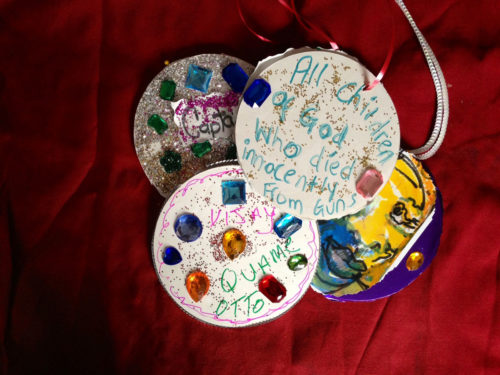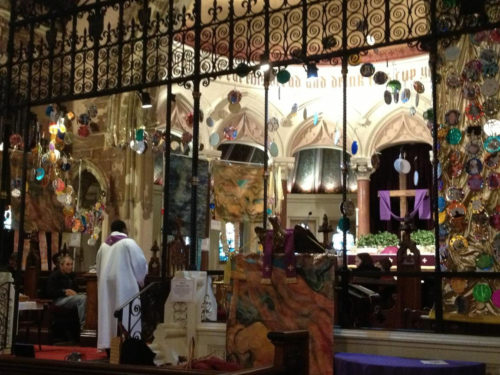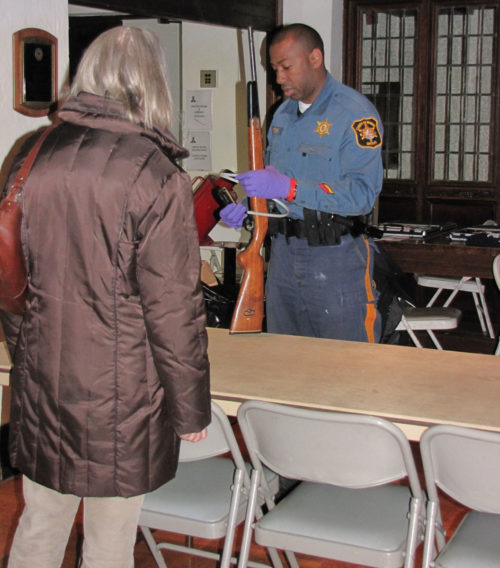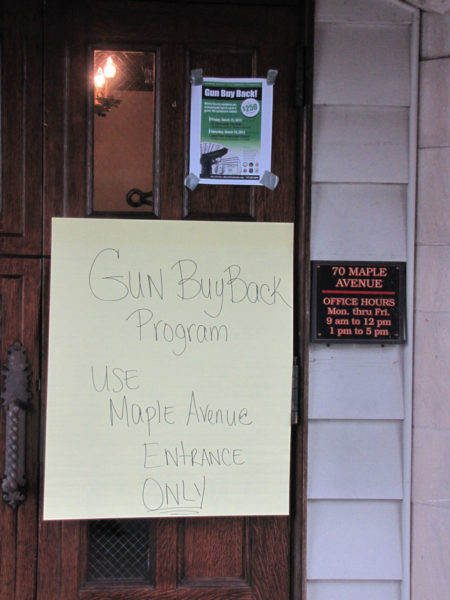Churches keep up the pressure to reduce gun violencePosted Mar 21, 2013 |
|

Parishioners at St. Stephen’s Episcopal Church in Lynn, Massachusetts, observed the Gun Violence Prevention Sabbath by creating “heavenly hosts” as part of an art installation at the church. Hung in the sanctuary, each “host” commemorates victims of gun or other violence, or other people the creators wished to honor. Photo/Jason Cruz
[Episcopal News Service] When Episcopal clergy and laity gather March 25 for a Holy Week Way of the Cross procession in Washington, D.C., it will be the latest in a host of church activities aimed at highlighting and combating gun violence. Across the nation, Episcopalians have lobbied legislators to support gun-control laws, visited gun venders, hosted gun buybacks, created artwork memorializing gun-violence victims, preached about gun violence and observed a Gun Violence Prevention Sabbath.
The current emphasis on reducing gun violence stems from the Dec. 14 fatal shooting of 20 pupils and six educators at Sandy Hook Elementary School in Newtown, Connecticut.
The Diocese of Connecticut’s bishops partnered with Bishop Mariann Edgar Budde and other members of the Diocese of Washington in planning the March 25 procession, which more than 20 bishops and other Episcopalians from around the country are expected to join.
“We are taking our witness to our nation’s capital to say to our political leaders and to our country that we will no longer be silent while violence permeates our world, our society, our church, our homes and ourselves,” Connecticut Bishops Ian Douglas, James Curry and Laura Ahrens wrote to their diocese. “The walk, and particularly the reflections at each station, will reflect our commitment to transformational change and the proclamation of God’s hope to the world.”
In Chicago, where gun violence long has been a concern, Episcopalians from across northern Illinois and their partners in more than 65 faith-based and civic organizations will participate March 22 in the second annual CROSSwalk, a four-mile procession to remember Chicago’s murdered youth.
“We simply cannot continue to ignore the heart-wrenching loss of young life that occurs with such horrifying frequency in Chicago and other cities in northern Illinois,” Chicago Bishop Jeff Lee said in a press release. “CROSSwalk calls us to pray, to build relationships and to act as though lives depend on us. And they do.”
In Washington, D.C., Washington National Cathedral partnered with Faiths United to Prevent Gun Violence to present a series of events March 14-17 to mark a Gun Violence Prevention Sabbath Weekend. Religious leaders, Congress members, gun-control advocates, law-enforcement officials and medical and mental-health professionals gathered for prayers and discussions about gun violence and ways to combat it. March 16 featured a national conversation on faith-inspired public policy on gun violence and an interfaith discussion featuring Christian, Islamic and Sikh leaders. The weekend concluded with Sunday worship, where cathedral Dean Gary Hall preached: “[W]e at Washington National Cathedral are in this gun-violence work for the long haul. We won’t give up until our streets and our schools and our children are safe. We owe at least that much to our children, our neighbors, ourselves.”
About 100 people attended the March 16 programs at the cathedral, while others around the country watched a live webcast, said cathedral Communications Director Richard Weinberg. “We know that close to 400 houses of worship across the country had signed up to participate in some way.” This included at least 14 Episcopal congregations, he said.
Plans are underway to continue the anti-violence work.
“We really thought the conversations were rich and meaningful, and we think there’s a way to package excerpts of the day’s events and worship for congregations across the country to continue in dialogue on the issue of gun violence,” Weinberg said, adding, “We are already in dialogue on staff and with our partners about future events.”
Varied responses
While some congregations watched the webcast, others who signed up observed the Sabbath in other ways.
St. Andrew’s by the Lake in Duluth, Minnesota, used the national event “as a goad for our own development locally,” said Vicar Theo Park. “We’ve been trying to pull together a comprehensive campaign.”
Park has preached on gun violence, and a member of the church’s Peace and Justice Committee – which handles outreach – has staffed a table during coffee hours with contact information for lobbying legislators. “So there’s a presence and there’s been a statement, but the [mission] as a whole has taken no official stance,” Park said.

“Heavenly hosts,” created by parishioners at St. Stephen’s Episcopal Church in Lynn, Massachusetts, as part of an art installation there, honor victims of gun and other violence. Photo/Jason Cruz
The Rev. Jane Gould, rector of St. Stephen’s Episcopal Church in Lynn, Massachusetts, connected with the Sabbath through People Improving Communities through Organization, or PICO, a national network of faith-based community organizations. Gould preached about gun violence and invited parishioners to create “heavenly hosts” in memory of victims of gun violence as part of an art installation at the church.
St. Stephen’s is hosting an installation of “The Way of Salvation,” Stations of the Cross created by diocesan Deacon Gay Cox. The last element is a sanctuary display of “heavenly hosts.” Congregation members were invited to create them, placing colorful shiny paper on one side of CD-sized Styrofoam circles and attaching photos or writing names of victims of gun or other violence, or others they wished to honor, on the other side.
“We had lots of glitter glue, regular glitter, jewels, ribbons – just whatever they wanted to put on their disc to honor someone,” Gould said. One couple decorated a disc in honor of their son, who died while serving in the military; the day of the activity was the anniversary of his death.
The hanging “hosts” will be veiled during Holy Week. “Then they will emerge in all their radiance for the [Easter] Vigil,” Gould said.
Previously, parishioners have lobbied Congressional and other leaders to support gun-control legislation. Even before the Newtown shootings, the Diocese of Massachusetts was grappling with how to combat gun violence following the shooting death of Jorge Fuentes, a young leader from St. Stephen’s Church in Boston and its B-SAFE summer program. The diocese established an anti-violence task force in his memory at its November convention.
Gun violence is not an abstract concern in Lynn. “We’re in a small city with a significant gang presence,” Gould said. Lynn was among eight communities to receive state funding as part of a Safe and Successful Youth Initiative attempting to “stop the bloodletting in the cities,” she said. “Luckily, we don’t have as many deaths by gun violence.”
But one of her parishioners has a cousin hospitalized after being shot three times, she said. “He’s alive; they didn’t think he’d make it through the night.”
“Most of our kids have a friend who’s died” of gun violence, she said.
Gun buyback
Beyond observing the Gun Violence Prevention Sabbath, Episcopal churches have addressed gun violence in other ways in recent weeks.

Chief of Investigations William Schievella of the Morris County Prosecutor’s Office holds an assault weapon, illegal in New Jersey, that was surrendered during the March 15-16 anonymous gun buyback hosted by the Roman Catholic St. Paul Inside the Walls in Madison, New Jersey, and St. Peter’s Episcopal Church in Morristown. Displayed in front of him at a March 18 press conference are about half of the 600 weapons collected in the program, which paid varying amounts totaling nearly $50,000 to those turning them in. Photo/Sharon Sheridan
On March 16, St. Peter’s Episcopal Church in Morristown, New Jersey, partnered with Morris County law-enforcement agencies to host an anonymous gun buyback. The event collected 600 guns – including 15 assault weapons illegal in the state, 91 semi-automatic weapons, 192 revolvers and 251 rifles and shotguns – at St. Peter’s and on March 15 at the Roman Catholic St. Paul Inside the Walls in Madison.
When planning the buyback, officials contacted the Morris Area Clergy Council, of which St. Peter’s is a member.
“We thought it was a good idea to partner with the clergy,” said William Schievella, chief of investigations with the Morris County Prosecutor’s Office.
Individuals who have had contact with law enforcement previously may feel more comfortable talking to officers while at a church, he explained. And people might not have felt comfortable coming to a county administration building to turn in weapons, but at a church, “they know it’s a house of worship, and they know it’s an open place for them to come,” he said.
St. Peter’s participated, said Rector Janet Broderick, because “we want to say that life is sacred with our actions – all life. We want to say that every gun which is melted down is one less opportunity for God’s creation to be harmed.”

Det. Craig Brooks of the Morris County Sheriff’s Office inspects a weapon surrendered during an anonymous gun buyback hosted by St. Peter’s Episcopal Church in Morristown, New Jersey. Photo/Sharon Sheridan
Guns collected were checked to see if they were loaded (none were) and if they were stolen (three were), officials said during a March 18 press conference. Further checks will identify any weapons used in crimes that must be saved as evidence; the rest will be destroyed. The nearly $50,000 distributed to those surrendering the guns came from donations to the county CrimeStoppers program and from forfeitures from criminal assets.
Morris County is among several New Jersey counties to hold buybacks, with about $900,000 total paid to buy more than 7,000 weapons.
“The primary purpose is to get these things off the street,” Schievella said during the press conference. Acting Prosecutor Fredric Knapp noted that surrendering firearms ensured no one could steal them. “Burglary has traditionally been a problem in suburban communities.”
That was what prompted one man to come to St. Peter’s to surrender two small handguns left among the possessions of his father when he died in 2002. The son tried bringing them to a police department at the time but was told there was no provision for turning them in.
“They were real small. You could actually put them in a pocket,” he said. He placed them in a small safe but worried about them being stolen because his home had been burglarized before. “The safe is small enough, somebody could carry it away.”
Although a legal gun owner, he said he was glad to be rid of the handguns. “I’ve been waiting for this.”
One woman read about the buyback in the newspaper. “There has been this target rifle in my attic for 30 years, and I said to myself, ‘I’m going to turn it in.”
She wrapped the rifle, left behind by an ex-spouse, in newspapers and was pleased that one of the officers removed it from the car for her. “I was really uncomfortable driving here with a gun in my car. I’m not a gun person,” she said. “It’s very unnerving to be near firearms.”
Beyond the buyback, St. Peter’s and other churches in the Episcopal Diocese of Newark are involved in ongoing efforts to raise awareness about and combat gun violence.
In December, a week after the Newtown shootings, Broderick spearheaded an effort to have banners hung at clergy council member churches – including St. Peter’s and the Episcopal Church of the Redeemer in Morristown – and town hall and the high school declaring: They Were All Our Children.
On Valentine’s Day, the two-month anniversary of the shootings, St. Peter’s Assistant Rector Melissa Hall, Redeemer Rector Cynthia Black and church laity participated in a rally on the town green against gun violence.
Lobbying efforts
More recently, Broderick joined a clergy delegation from NJ Together, an interfaith coalition affiliated with the Industrial Areas Foundation, in meeting Rep. Rodney Frelinghuysen (R-11th District), a parishioner, to urge him to back gun-control legislation.
“I think he shared our sense that there are some common-sense measures that should be on the books federally to keep guns out of the hands of criminals, but he didn’t commit to supporting them,” said Joe Morris, NJ Together staff organizer. “I think it was a good first meeting, and we’re going to follow up and find out where he stands on these things.”
NJ Together also met with Rep. Scott Garrett (R-5th Dist.) “I think we asked him for five things, and we were 0 for 5,” Morris said. “He told us that he thought that the clergy should do a better job preaching against violent video games.”
“We’ve been kind of using the mandate in Leviticus – ‘Do not stand idly by while your neighbor’s blood is shed’ – which has been kind of a helpful motivation for us but also as a way of evaluating others,” he said. “We came away feeling like Scott Garrett is just standing idly by.”
Elsewhere in the diocese, the Rev. Joseph Harmon, rector of Christ Episcopal Church in East Orange, has been active with NJ Together

A sign on the parish house at St. Peter’s Episcopal Church in Morristown, New Jersey, directs participants to the county’s anonymous gun buyback program on March 16. Photo/Sharon Sheridan
and recently joined other clergy in meeting with East Orange Mayor Robert Bowser to discuss possible strategies for controlling gun violence.
On March 14, a NJ Together group of 14 clergy and laity from four synagogues and three Episcopal churches – Christ Church; All Saints, Hoboken; and Grace Church, Newark – visited three gun venders in Paramus to learn about their policies and urge them to sign on to a Mayors Against Illegal Guns 10-point voluntary code for gun retailers. The code includes actions such as videotaping firearms transactions.
“It was a very positive experience, I think, for all of us,” said Harmon, who participated with some of his parishioners. “We showed up unannounced, and we were very well-received at Dick’s Sporting Goods. The manager spoke very freely and very readily, as did the person behind the gun counter.”
They learned that Dick’s has continued a policy of not selling automatic weapons that it put in place after the Newtown shootings and that “the only guns that they will sell are guns used in hunting,” he said. “They do not sell large-capacity magazines, and they do not sell handguns. That’s their policy, and we applauded them for it. We hope other venders like Walmart and Sports Authority and Ramsey [Outdoor] would come on board with similar kinds of proactive policies.”
“The folks at Ramsey were much more cagey. … They said that the manager was not available,” Harmon said. “It seems like Sports Authority is moving in a similar direction as Dick’s, but we didn’t have information to officially verify that.”
NJ Together is discussing making additional vender visits, he said. “Part of our purpose is not simply to point out the folks whose policies are not very open to ending gun violence … but to recognize those venders that are exercising discretion and sensitivity to the issue, like Dick’s.”
On April 14, NJ Together will hold “a major gathering” at Christ Church for Northern New Jersey congregations involved in the anti-gun violence effort and for newcomers “to come and hear what we’ve been doing, to share their thoughts and hopes and just basically to let each other know that we are here and that our voices in unison and in number can be effective,” Harmon said.
The coalition involves Christians and Jews, Muslims, Sikhs and Baha’i, he said. “It is truly an interfaith effort, and it’s growing.”
The tenets of the various faiths all support taking action, he said. “We have the witness of the Christian faith of Jesus Christ, the witness of Muhammad in the Muslim faith, the witness of the prophets and the law in the Jewish faith, and the peaceful spirit that comes from the other faith communities that compel us to stand up and speak out against gun violence.”
— Sharon Sheridan is an ENS correspondent.

Social Menu